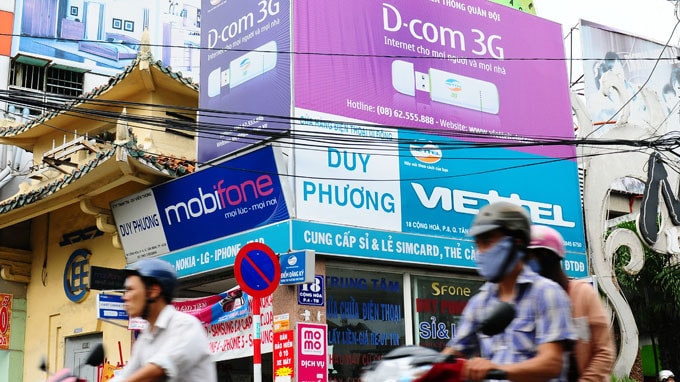Unusual 3G fee increase: Signs of violating Competition Law
Although the Ministry of Information and Communications and network operators explained that the increase in 3G fees was inevitable, experts in competition law affirmed that businesses have shown signs of violating the law at least twice since the beginning of the year.
 |
| MobiFone and Vinaphone toll collection points on Tran Hung Dao Street, District 1, Ho Chi Minh City - Photo: Q.Dinh |
Meanwhile, thanks to the price increase, according to preliminary calculations, 3G revenue of network operators increased by thousands of billions of VND. Experts say that network operators need to publicize the cost of 3G services.
The law allows an increase of no more than 5%, while the network operator increases it by 40%.
Speaking to Tuoi Tre on October 15, Mr. Ha Hai - head of Ha Hai Law Office (HCMC) - said that with a 97.3% market share, the increase in 3G rates by 40% by three network operators shows signs of agreement to increase rates, violating the provisions of Article 11 of the Competition Law on abuse of dominant market position. These businesses have acted together to increase rates at the same rate, the rates after the increase are equal, and the package capacity is the same.
According to Mr. Hai, the Competition Law prohibits enterprises and groups of enterprises with a dominant market position from providing services below the total cost in order to eliminate competitors. "If it is true that the representative of the network operator said that the price of 3G service before October 16 was only 50% of the cost, then the network operator has violated the law for a long time," the lawyer said. However, in reality, up to this point, no network operator has publicly disclosed what the input costs are, and how much they are...
Competition Law expert, Dr. Nguyen Ngoc Son (Ho Chi Minh City University of Economics and Law) said that even without any secret agreement, these carriers have shown signs of violating the law twice this year. Specifically, in April 2013, Vinaphone and MobiFone increased the most popular package by 30%. MobiFone holds a dominant position in the market. Together, MobiFone and Vinaphone are the group of enterprises that dominate the market. According to Decree 116 guiding a number of articles of the Competition Law, enterprises and groups of enterprises with a dominant position in the market are not allowed to increase prices by more than 5% at a time or multiple times with a total increase of more than 5% in 60 consecutive days when there are no unusual fluctuations that increase the cost of production of goods and services. "If they cannot prove that the cost has increased, they are violating the law," said Mr. Son.
Lawyer Ha Hai also said that at the same time, these businesses simultaneously increased 3G prices up to 40% while 3G demand did not increase dramatically, did not exceed supply, this price increase far exceeded the 5% level as prescribed, in the condition that production costs did not fluctuate, and also violated the provisions on ensuring consumer rights regarding goods prices of the Commercial Code.
 |
| The fact that network operators with dominant market share simultaneously increased 3G rates by 40% is a sign of violating the Competition Law - Photo: Q.Dinh |
Network operators pocket thousands of billions of dong
Despite consumers' frustration with the quality of 3G services since the previous 30% increase in 3G fees, this time not only did the network operators not improve the quality of services but also increased it even more. Millions of 3G subscribers had to pay more for services since October 16. Thanks to that, the network operators have a large additional revenue. In 2013, the 3G service revenue of the network operators was estimated at VND7,200 billion. If the average increase of 20% in revenue is calculated according to the permission of the Ministry of Information and Communications, the increased fee could help the network operators pocket an additional VND1,440 billion each year.
The comparison of 3G rates in Vietnam and other countries by the rate management agency and network operators to explain the rate increase has also been criticized by experts. An economic expert said that it is a lame comparison. “The comparison is only valuable when done on the same reference system. When there is a difference, the comparison result is worthless, there cannot be a common number to measure. Internet and telecommunications development policies and the current development status in each country are different. Taxes, fees, and costs of exploiting telecommunications resources are different. Per capita income is also different... Therefore, it is impossible to say whether Vietnam is cheaper or more expensive,” said this expert.
Dr. Nguyen Ngoc Son said that in the past, when the telecommunications industry was still a monopoly, phone rates in Vietnam were much higher than they are now. After the monopoly was broken, although it still had the unique nature of only a few participating businesses, from a monopoly to a few businesses dominating the market, it contributed to increasing competition clearly. However, with the 3G package alone, the management agency allowed businesses to go against the rules of competition because it did not benefit consumers.
The Telecommunications Department has approved an increase in 3G fees.
On October 15, answering Tuoi Tre via phone, Mr. Nguyen Duc Trung - Deputy Director of the Department of Telecommunications (Ministry of Information and Communications) - said that the department is reviewing and preparing contents related to the network operators increasing 3G fees and will have an official announcement on how the network operators will implement it to the media agencies.
According to Tuoi Tre's investigation, the Telecommunications Department previously approved 3G packages of three mobile networks with controlling market shares, including Vinaphone, MobiFone and Viettel. Accordingly, the prices and methods of calculating 3G charges of mobile networks have all been approved by the Telecommunications Department. The reason for the increase in 3G charges is that this charge in Vietnam is very low compared to other countries in the region and the world. Networks with controlling market shares are currently selling 3G packages below cost, so the Ministry of Information and Communications has a policy requiring telecommunications enterprises to calculate each service separately and clearly so that they cannot sell below cost and cannot cross-subsidize between services to ensure healthy market development.
The Telecommunications Department has also issued a document requiring mobile networks, along with increasing 3G fees, to announce the quality of 3G services and ensure the quality of services as committed to customers.
* Lawyer Tran Minh Hai (Hanoi Bar Association):
Unreasonable price increase
According to the Competition Law, one of the prohibited anti-competitive acts is: directly or indirectly agreeing to fix the price of goods and services. Thus, it is necessary to verify whether there is an act of “unanimously acting together” among network operators. MobiFone, Vinaphone and Viettel are groups of enterprises with a dominant market position, and according to regulations, are prohibited from imposing unreasonable purchase and sale prices of goods and services, causing damage to customers.
Enterprises have the right to justify price increases based on the basis approved by the competent state management agency, but the provisions of the Competition Law still need to be considered for enforcement in this case.
* Mr. Nguyen Tien Thoa (General Secretary of Vietnam Valuation Association):
There are signs of abnormality
The fact that three businesses Vinaphone, MobiFone and Viettel simultaneously increased 3G service prices shows signs of abnormality, because these businesses increased prices at the same rate and at the same time and the increase was quite high.
I propose that the Ministry of Information and Communications coordinate and submit a document to the Prime Minister requesting to examine the price formation factors for 3G services. In particular, the Ministry of Finance must also coordinate with the Ministry of Information and Communications to clarify 3G rates because this is also the authority and responsibility of the price management agency.
(According to TT)- HL






